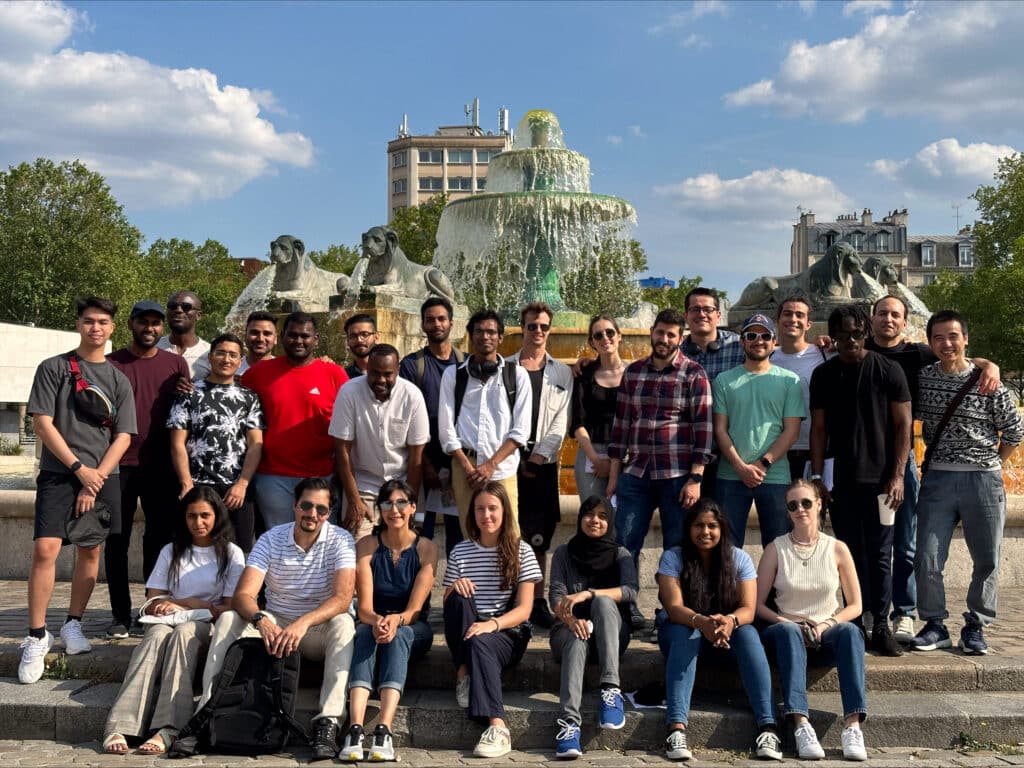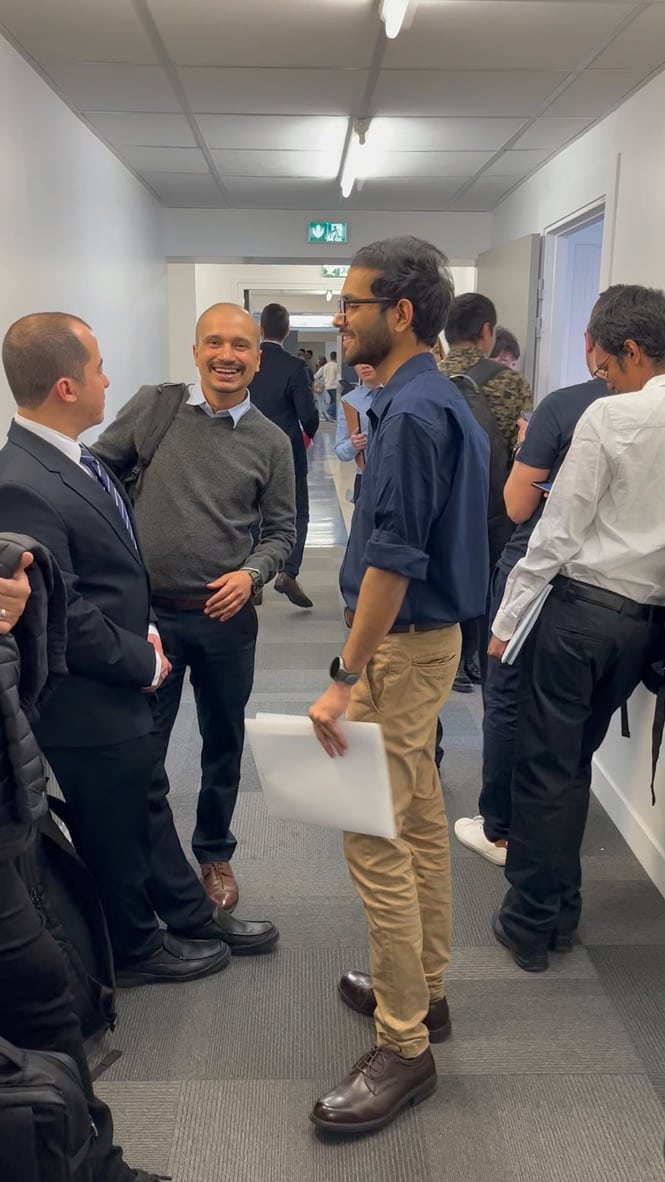
The MSc in Computer Science provides a perfect combination of the most important and powerful theoretical basis of computer science, and their applications in current technology and professional fields.
This program is accredited by the Conférence des Grandes Écoles (CGE) and is offered entirely in English. Students can choose one of the four specializations offered for the third semester to specialize in:
- Software engineering (SE)
- Data Science and Analysis (DSA)
- Computer, Applications, Network & Information Security (CS)
- Innovative Information Systems Management (i-ISM)
Program
Structure
The program is composed of 12 months of classes and a 6-month internship. To obtain their degree, students must acquire 120 ECTS (European Credits Transfer Systems) over the 18-month period and the French A2 level.
| Semester 1 (S1) | Semester 2 (S2) | Semester 3 (S3) | Semester 4 (S4) |
| 30 ECTS | 30 ECTS | 30 ECTS | 30 ECTS |
| Fundamental | Common Core | Specialization | Internship |
| 12 Months | 6 Months | ||
| On campus | In company | ||
This semester has two main objectives:
- Unify students’ knowledge, independent of their current level, by establishing a common scientific background in mathematics and programming as a prerequisite for future semesters;
- Culturally integrate students, thus reducing their culture shock via French as a Foreign Language (FLE) courses, an integration program introducing French culture and civilization, a coaching program and daily immersion in campus life.
This semester consists of 300 hours of classes.
Course List
- Advanced Algorithmic
- Operation Systems: Unix
- Introduction to Python
- Relational Databases
- Digital Transformation
- Data Privacy by Design
- Introduction to Block Chain & Bitcoin
- Introduction to Network Protocols & Architecture
- Technical Warmup
- Corporate Finance
- Communication for Leaders
- Project Management Principles
- Enterprise Essentials
- Cultural Integration Workshop
- General French (All levels)
- Adapting to a New Culture
In the second semester, students transition into specialized coursework tailored to their chosen area of expertise: Data Science & Analytics, Software Engineering, Innovative Information Systems Management, or Computer Security. While delving deeper into their respective fields, students also undertake common courses shared across specializations, ensuring a well-rounded foundation. Through a mix of theoretical learning and hands-on projects, they refine their skills and knowledge, preparing for the final semester where they will fully specialize in their chosen domain. This phase equips students with the necessary tools and insights to excel in the ever-evolving landscape of computer science.
This semester consists of 300 hours of classes.
Innovative Information Systems Management i-ISM
This specialization prepares students to become a high demand professional in building the digital future. It trains students to become leaders of the transformation of companies towards evolutionary computing aligned to business requirements.
- Career Project Elaboration
- Change Management
- Digital Marketing and Social Media Strategy
- Creativity & Design Thinking
- IT Service Management 1
- General French (All levels)
- Big Data Infrastructure & Cloud Computing
- Kaggle Week
- Green IT
- IT Strategy
- Project Management Workshop
- Enterprise Information Systems Architecture
Software Engineering SE
This specialization nurtures “Digital Leaders” who can innovate, propose new content, create new uses and services, using open sources technologies or those of the large software publishers. It prepares students to design, plan, develop, implement, test, and maintain qualified software and applications.
- Career Project Elaboration
- Digital Marketing and Social Media Strategy
- Green IT
- ITIL
- General French (All levels)
- Advanced C
- Software & Database Security
- Android Initiation
- OOA & UML & Java
- Introduction to IOS
- Big Data Infrastructure & Cloud Computing
- Kaggle Week
Computer Security (CS)
This specialization equips students with the knowledge and skills to master cybersecurity issues and deal with a cyber threat. It trains information and cybersecurity experts to protect vital systems and networks. It combines learning system from design to administration, existing and new generations networks and cybersecurity from organizational and technical aspects. Students should be able to train information and cybersecurity experts to protect vital systems and networks.
- General French (All levels)
- Digital Marketing and Social Media Strategy
- Career Project Elaboration
- Big Data Infrastructure & Cloud Computing
- Kaggle Week
- PKI, DMZ & Proxy
- Social Engineering & Physical Intrusions
- Hands-on Hacking
- Introduction to Cryptology
- Unix System Administration
- Linux for Security
Data Science and Analysis (DSA)
The program is to provide a solid foundation in machine learning and programming along with practical experience. It combines computer and statistical sciences to develop leading edge tools to efficiently deal with data processing (Big Data) learning how to develop methods, algorithms and software capable of extracting and presenting valuable information.
The DSA program is an opportunity for IT engineers and specialists to differentiate themselves and advance their knowledge in a field that will be paramount to the future of business.
- General French (All levels)
- Career Project Elaboration
- Digital Marketing and Social Media Strategy
- Big Data Infrastructure & Cloud Computing
- Mathematics for Data Science
- OOA & UML & Java
- Kaggle Week
- NoSQL Databases
- Data Exploration & Preparation
- Foundations of Statistical Analysis & Machine Learning
- Data Science in Production 1
This semester allows students to fully specialize in one of the specializations: Software engineering (SE), Data Science and Analysis (DSA), Computer, Applications, Network & Information Security (CS) or Innovative Information Systems Management* (i-ISM).
This semester consists of 300 hours of classes.
Innovative Information Systems Management i-ISM
- Customer Relationship Management (CRM)
- Enterprise Integrated Business Application
- Supply Chain Management (SCM)
- General French (All levels)
- IT Purchase
- Project for Research & Innovation (#2)
- Knowledge Management & Innovation
- Business Intelligence (BI)
- Innovation Ecosystem
- Innovation Workshop
- Business Process Management
- Cross-Border Management
- Consulting Essentials
- IT Service Management
Software Engineering SE
- General French (All levels)
- Cross-Border Management
- Knowledge Management & Innovation
- Advanced Databases
- .Net And C# Programming
- Advanced Java Programming
- Structured Data & Transportation
- Advanced Javascript
- Web Applications Patterns
- General Front-end Development Principles
- Front-end Applications
- Progressive Web Applications
- How to use Devops Approach
- Software Industrialization
- Software Quality Assurance
- Action Learning
Computer Security (CS)
- General French (All levels)
- Cross-Border Management
- Knowledge Management & Innovation
- Action Learning
- Malware Analysis
- Penetration Testing
- Python for Security
- Software & Database Security
- Web Applications Security
- Reverse Engineering
- Security Operation Center
- Identity Access Management
- Digital Forensics & Incident Response
Data Science and Analysis (DSA)
- General French (All levels)
- Cross-Border Management
- Knowledge Management & Innovation
- Computer Vision
- Natural Language Processing
- Action Learning
- Data Science in Production 2
- Predictive Analytics & Data Mining
- Business Intelligence (BI)
- Big Data Infrastructure & Cloud Computing
- Data Reporting & Visualization
- Neural Networks & Deep Learning in Python
The last semester, the internship, is part of the MSc Computer Science program and is therefore compulsory. Such an experience is essential for cultural, educational, and cultural reasons: using new competencies in a new environment is a priceless advantage for every student at EPITA. Even for those who already have a working experience here or abroad, the internship opens doors to students for a bright future full of new opportunities. Students of this program are paid by the company between €1,000 and €1,500 per month during their internships.
As students need to provide an official A2 level attestation in French in the end of their program, EPITA organizes TFI (Test de Français International) sessions during the fourth semester. In order to prepare them to the particularities of this exam, the students will be offered a 10 hours preparation course.
Student Testimony
EPITA, my gateway to master in software engineering has been an extraordinary chapter of growth and achievement. The comprehensive curriculum delved deep into advanced concepts while speaking French at professional level and sharpening my practical skills through this program and its internships.
The renowned faculty fostered an environment of intellectual curiosity and mentorship, guiding me towards greatness. Collaborating with diverse peers, I embraced
teamwork and developed invaluable communication skills. EPITA provided the perfect launchpad for my career, equipping me with the knowledge, confidence, and
network to excel in the competitive tech industry. Grateful for this transformative experience, I am now ready to make my mark as a skilled software engineer.
Adnan Ali Khan, Class of 2022
Student Testimony
What jobs can the MSc Computer Science program lead to?

- Full Stack Developer
- Software Engineer
- Software Architecture
- Technical Manager
- Database Administrator
- Front End Applications Developer
- Data Analyst
- Data Science Manager
- Data Science Consultant
- Big Data Engineer
- Security Consultant
- CISO
- Cyber Expert
- Infrastructure & Operations Manager
- System Administrator
- Security Consultant
- Security Architect
- Security Operation Center Manager
- Innovation Consultant
- Project Manager
- Product Owner
- Business Analyst
- IS Consultant
- IT Operations Analyst
- Applications Manager
- Startup Creator
You wish to Study at EPITA?
You have questions?

